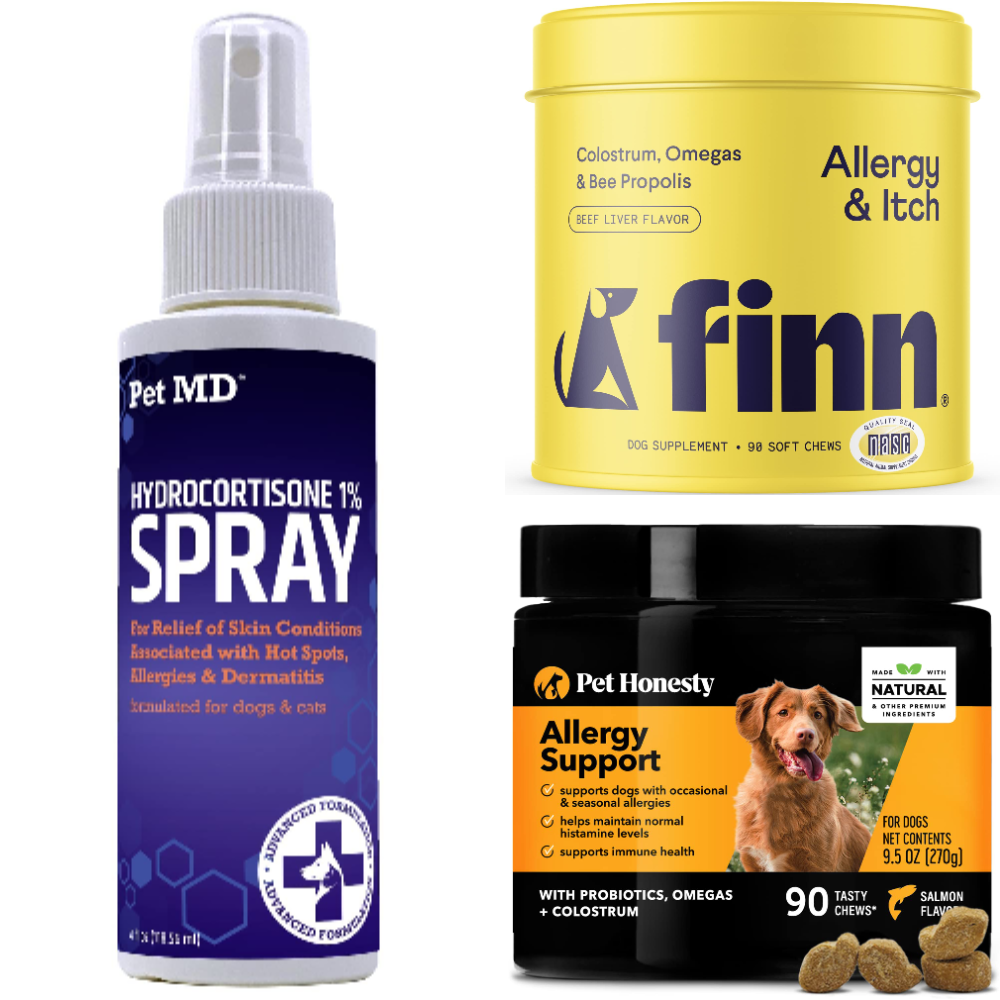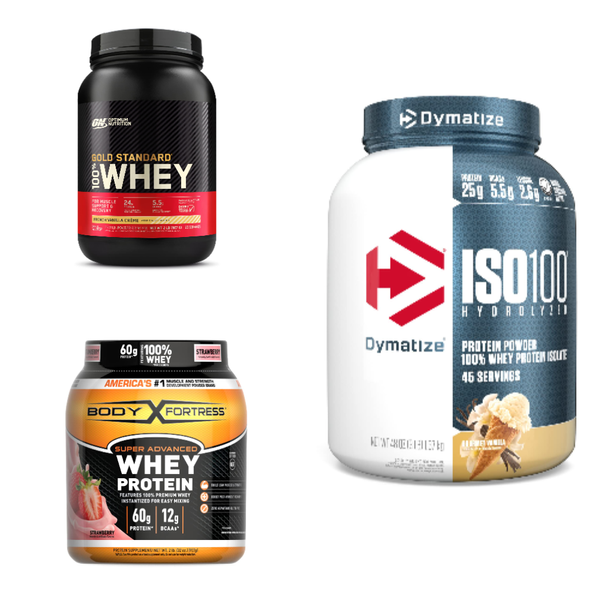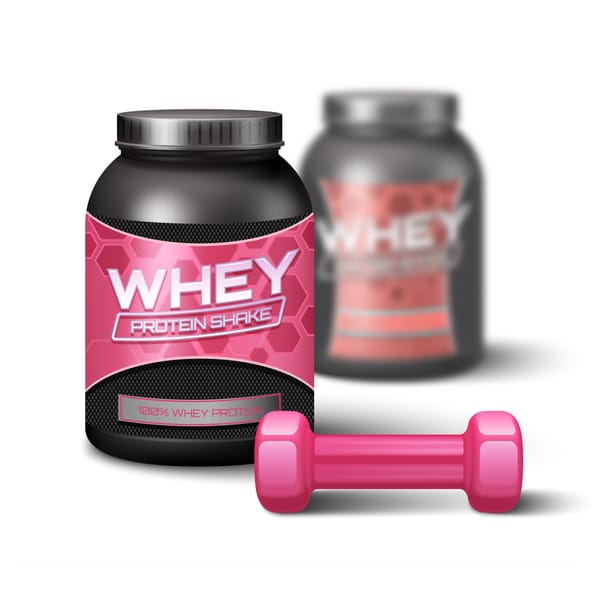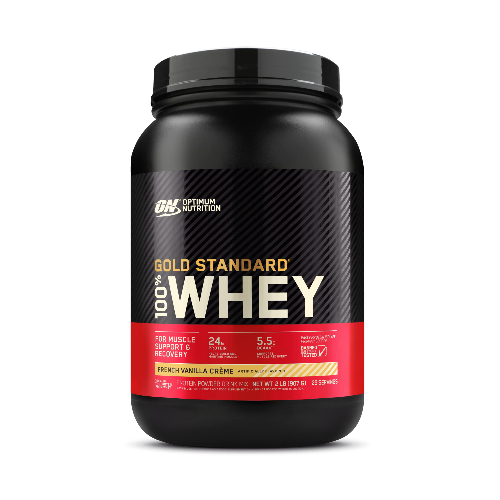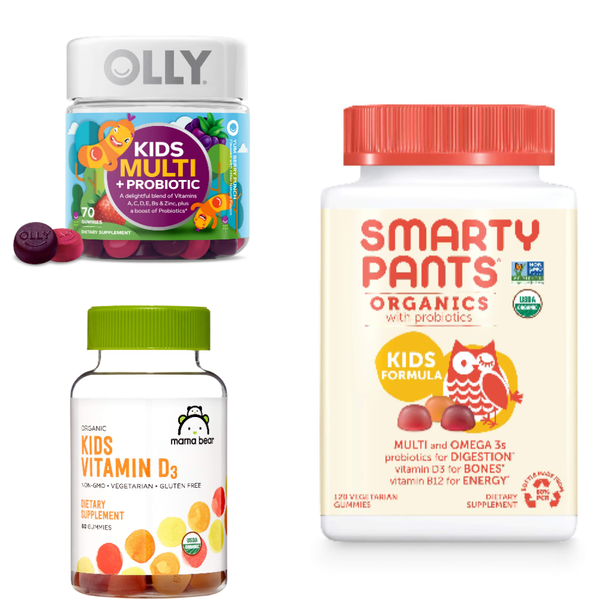The best allergy medications for dogs can help your furry friend live a happy, comfortable life. If your dog has developed an allergy to something in his environment, the symptoms of allergic reactions can be unpleasant and uncomfortable for him too.
If your dog is suffering from an itchy or runny nose, paws, or ears and you suspect that he may have an allergy, then it's time to speak to your vet about what options are available to treat the problem. Your vet will be able to tell you if any specific food products may alleviate some of the dog allergy meds symptoms.
There are various types of medication available so it's worth speaking with your vet about which one would suit your dog's food and best as they all vary in both price and effectiveness. It's also worth noting that while most of these medications work well on adult dogs, they're not designed for puppies due to safety reasons so don't give them out before receiving advice from a vet first.
We hope you find your next favorite thing from the list below! Each product was independently selected by our editors. ConsistentReviews may collect a share of sales or other compensation from the links on this page if you decide to buy something (that's how we stay in business). We hope you find your next favorite thing!
How We Choose
We looked at the most common ingredients in dog allergy medicine and compared them to the active ingredients in popular over-the-counter human allergy medications. We also read through hundreds of customer reviews to get an idea of real-world use cases. Based on all of this information, we were able to narrow down our list to only the best allergy medicines for dogs that are safe and effective when used as directed.
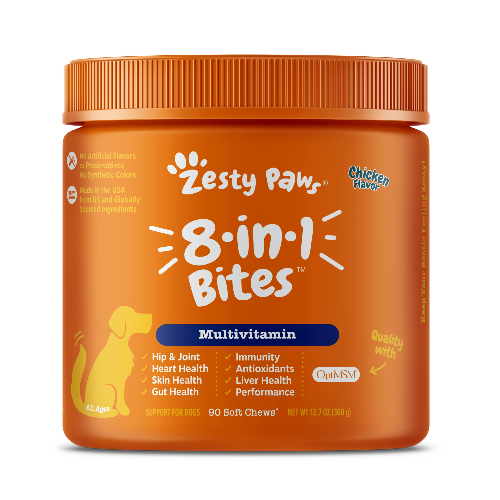
Multifunctional Supplements for Dogs – Omega Fish Oil with Antioxidants and Vitamins for Skin & Heart Health Chicken 90 Count
Skin Health & Antioxidants
Why We Love It
The ZP7505 Multifund Bites by Zenwise is a great choice for dogs of all ages and breeds. They contain high-quality ingredients that have been proven to support the health of your dog's joints, skin, gut, heart, muscles, and more.
What You Should Know
These chews are packed with probiotics to help keep your dog's digestive system healthy and functioning properly. They also contain glucosamine and chondroitin sulfate to provide added joint support. The fish oil in these bites is rich in antioxidants to help protect against free radical damage caused by UV rays or pollution exposure.
They're also free from artificial colors or flavors so you can feel confident about what you're feeding your best friend.
Pet Honesty Dog Allergy Relief Immunity Chews
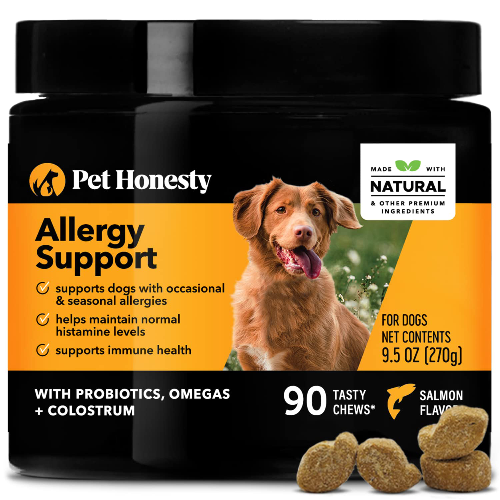
Pet Honesty Dog Allergy Relief Immunity Chews
Support A Healthy Immune System And Digestion
Why We Love It
The Pet Honesty Dog Allergy Relief Immunity Chews are a great choice if your dog suffers from seasonal allergies. These chews contain natural ingredients that support a healthy immune system and skin health, which is why they're perfect for dogs that suffer from seasonal allergies.
What You Should Know
They also include colostrum, salmon oil, turmeric, organic mushrooms, and probiotics to support a healthy immune system and digestive tract. By combining these ingredients with colostrum, you can rest assured that your dog will be getting the best quality supplement possible.
The chews are made in the USA with only high-quality US and globally sourced ingredients derived from natural sources so you know you're getting a premium product without any harmful additives or preservatives.
Advanced Allergy & Itch Relief Dog Chews

Advanced Allergy & Itch Relief Dog Chews
New Advanced Allergy and Itch Relief Formula
Why We Love It
The STrellaLab Advanced Allergy & Itch Relief Dog Chews are a great option for dog owners who want to treat their pets for allergies and irritation without resorting to harmful chemicals. These bacon-flavored chews contain all-natural ingredients, including fish oil and probiotics, which help support the immune system.
What You Should Know
The treats are made in the USA, following strict quality control standards, so you can rest assured that your dog will enjoy them. They're also easy to serve, requiring no hassle with pills, powder, or spray. The mild formula takes advantage of digestive enzymes and pumpkins to support intestinal health.
These chewable tablets have been designed specifically to relieve skin problems such as hot spots and itchy skin in dogs. They're an excellent option for those looking for natural remedies without having to rely on harsh chemicals or shampoos.
Pet MD Hydrocortisone Spray for Dogs, Cats, Horses - Itch Relief Spray & Hot Spot Treatment for Dogs, Irritated Dry Itchy Skin, Allergies, and Dermatitis - Reduces Topical Inflammation - 4 oz

Pet MD Hydrocortisone Spray for Dogs, Cats, Horses - Itch Relief Spray & Hot Spot Treatment for Dogs, Irritated Dry Itchy Skin, Allergies, and Dermatitis
Itch Relief For Dogs And Cats
Why We Love It
As the seasons change, so do the skin issues that arise. From dryness to rashes and bumps, it can be difficult to find a product that effectively addresses these issues.
What You Should Know
One of the best options for relieving symptoms of dry skin is a hydrocortisone spray. This treatment helps to reduce inflammation and swelling, which helps relieve itchiness and redness. It's important to note that this product will not provide long-term relief from eczema or other skin conditions; however, it can help alleviate symptoms in between doctor visits or while undergoing other treatments.
It's recommended that you apply this spray directly to the affected area two times per day, allowing it to absorb before moving on to the next area. By using this product regularly, you can help prevent any flare-ups from occurring in the first place and keep your pet looking healthy all year round!

Finn Allergy & Itch Supplement for Dogs | Supports Seasonal Allergies, Itchy Skin, & Immunity
Powered by Bee Propolis
Why We Love It
The Finn Chews Allergy Support Dog Treats are a great choice for pet owners who want to give their dogs the best possible nutritional support during allergy season. These delicious dog treats contain high-quality fish oil, bee propolis extract, and colostrum from dairy cows.
What You Should Know
They also contain probiotics and prebiotics to help keep your dog's digestive system running smoothly and immune system strong so your pup can fight off any sniffles or sneezes. They taste great too – these salmon-flavored treats have a mild but satisfying fishy flavor that will satisfy even the most finicky of palates.
These tasty chews are made with 100% recyclable materials and have been certified by the National Animal Supplement Council (NASC). They come in a tin container which is both easy to store and eco-friendly - perfect if you're looking for an environmentally friendly treat option!

Allergies make it hard to breathe, but there are plenty of ways to help your pup feel better.
There's nothing worse than seeing your furry friend sneeze and wheeze, especially if you don't know how to help them feel better.
Having an allergic reaction is scary, but it doesn't have to be confusing. We've answered some of the most common questions about allergies in dogs below so that you can breathe easier knowing that you're doing all that you can for your four-legged friend.
What Is The Most Effective Allergy Medicine For Dogs?
There is no single best type of medication for allergies in dogs, as all the options have their side effects and benefits. Choosing which option is most suitable for your dog will come down to several factors including cost, convenience, severity of control allergy symptoms themselves, and any other medical conditions that may need to be taken into account.
The main classes of drugs used to treat allergies in dogs are antihistamines (H1 receptor antagonists), corticosteroids, immunomodulators, and non-steroidal anti-inflammatory drugs (NSAIDs). Again, these medications can be used on their own or in combination with each other depending on the needs and environmental allergies of your pet.
Non-sedating antihistamines such as fexofenadine are commonly prescribed first-line due to minimal side effects compared with other classes including cimetidine and ranitidine. If a non-sedating option does not alleviate symptoms however there are also sedating varieties such as hydroxyzine that can be considered if your dog has issues taking regular medication over long periods.
What Is The Most Effective Allergy Medicine For Dogs?
There is no single best type of medication for allergies in dogs, as all the options have their side effects and benefits. Choosing which option is most suitable for your dog will come down to several factors including cost, convenience, severity of control allergy symptoms themselves, and any other medical conditions that may need to be taken into account.
The main classes of drugs used to treat allergies in dogs are antihistamines (H1 receptor antagonists), corticosteroids, immunomodulators, and non-steroidal anti-inflammatory drugs (NSAIDs). Again, these medications can be used on their own or in combination with each other depending on the needs and environmental allergies of your pet.
Non-sedating antihistamines such as fexofenadine are commonly prescribed first-line due to minimal side effects compared with other classes including cimetidine and ranitidine. If a non-sedating option does not alleviate symptoms however there are also sedating varieties such as hydroxyzine that can be considered if your dog has issues taking regular medication over long periods.
Is Zyrtec Or Benadryl Better For Dogs?
Depending on your dog's needs and what you're looking for in a medication, either Benadryl or Zyrtec could be a good choice.
Both drugs are antihistamines, which means they help relieve allergy symptoms (itchiness, watery eyes, sneezing) by blocking the effects of histamine. The active ingredients in Zyrtec are cetirizine hydrochloride and docusate sodium; those in Benadryl are diphenhydramine hydrochloride and acetaminophen.
Dosages for dogs vary depending on their size: 4 to 8 mg of Benadryl per pound of body weight (or 2 to 4 mg per pound of body density). You can give Zyrtec orally at 2 mg per pound (or 1 mg per pound of body density).
In general, because these medications contain different substances, they have different side effects: Both may cause drowsiness or dizziness as well as dry mouth and constipation but only Benadryl causes sleepiness. These medications might also cause paradoxical reactions like agitation or excitement – so don't give them to dogs with behavior issues unless directed by a veterinarian.
What Do Vets Recommend For Dog Allergies?
Most veterinarians will recommend a hypoallergenic diet of dog food to help manage your pet's allergies. While it may sound strange, the idea behind a hypoallergenic diet is to reduce any kind of stress on the dog. Stress can trigger an allergic reaction, so by creating an environment that minimizes stress, you are helping to manage the dog's allergy symptoms.
The primary difference between regular commercial dog food and a hypoallergenic diet is that there is a reduced protein content compared to traditional formulas. This reduction in protein makes it more difficult for your dog's body to absorb many of the allergens that it would otherwise be exposed to through its sense of smell and taste (especially things like dust mites and pollen).
Typically, veterinarians will prescribe specific brands of hypoallergenic diets based on what has worked well with other patients in the past. This doesn't mean you have to stick with one brand though, as long as you're still following your veterinarian's instructions. You can also find out if there are any local support groups or organizations where people meet up with shared interests in specific types of breeds or mixes of breeds – these often offer free consultations from experienced breeders who may be able to recommend good products for your type of dog's needs.
Can I Give My Dog CVS Allergy Relief?
CVS allergy relief is not designed for dogs and can be harmful if your canine has a history of seizures. If your dog does have a CVS allergy, talk to your veterinarian about alternative medications that could help alleviate the symptoms. Be sure to keep any human medications out of reach of pets as they may prove deadly if ingested.
Can My Dog Take Zyrtec Every Day?
While it's perfectly safe for your dog to take Zyrtec every day, it may not be the best idea. You should only give Zyrtec to your dog when he needs relief from an allergy. If you give him a daily dose of the medication, he'll never get relief from his symptoms and they can worsen over time. Talk to your veterinarian about how frequently you should give your dog Zyrtec. They'll help you find a dosing schedule that provides relief without causing side effects or other problems.
How Much Zyrtec Do I Give My Dog?
The amount of Zyrtec you give your dog depends on their size and weight. If you're using the chewables, look at the side of the packaging to find out how many milligrams are in each tablet. Then, find your dog's weight on the chart below and multiply that number by the number of milligrams listed on your package. The result is how many chewable tablets you should give your dog every day.
If you're using liquid suspension capsules, read the information on the product insert to learn how to properly measure and give this medication to your pet.
Is Zyrtec Better For Dogs?
Generally, yes. The active ingredient in Zyrtec is cetirizine hydrochloride and it's the same for both humans and dogs. However, many veterinarians recommend using human forms of the drug because they are more consistent in dosage delivery (dogs can't take pills whole).
Also, some side effects can occur when using human Zyrtec with dogs such as changes to blood pressure or heart rate. Allergy medications like Benadryl may be a better option if your veterinarian feels your dog could be at risk while taking Zyrtec.
Can You Give Dogs Zyrtec Or Allegra?
Both Zyrtec and Allegra are human medications; they're not approved for dogs. Dogs lack the necessary enzymes to properly metabolize these drugs, so they won't have any of the desired effects — and could be seriously harmed by them as well. Giving your dog any non-approved human antihistamine can be dangerous, so make sure you keep all medications away from your pet. You may want to consider speaking with a veterinarian about other options for alleviating your dog's allergies or behavior problems.
What is the most common food allergy in dogs?
The most common food allergies in dogs are proteins, such as beef, chicken, and eggs. Other proteins that may trigger an allergy include dairy products, wheat, corn, and soy. To learn more about your dog's specific allergies, you should take him to the vet for testing. Your veterinarian can help you identify the source of your pup's discomfort so you can tailor their diet accordingly. Additionally, your vet may recommend medications or other treatments to help relieve your dog's symptoms. With the right food and a proper medication plan, you can keep your canine companion happy and healthy for years to come.
Do allergy shots work for dog allergies?
Yes, allergy shots can be very effective in reducing or even eliminating symptoms of allergies in dogs. This is an especially good option if your dog has frequent or severe allergic reactions to a specific allergen. Allergy shots work by introducing gradually increasing amounts of the allergen into the body, which helps it develop immunity over time. An allergist can help you determine if allergy shots are the best option for your pet. Be sure to closely follow your vet's instructions and be careful not to miss any appointments, as this could delay the effectiveness of the shots. It is also important to note that it can take several months before relief from dog allergy symptoms occurs, so patience is key!

In Conclusion, Allergy medicines for dogs are an important part of treatment for canine allergies. Veterinary-approved options can help reduce allergy symptoms and keep your furry friend happy and healthy. Look for products that contain non-steroidal anti-inflammatory drugs (NSAIDs) or corticosteroids to relieve itching, inflammation, and other discomfort caused by allergies. Be sure to speak with your veterinarian before choosing a medicine so you can find the right one for your dog's specific needs. With the right dog allergy treatments and medication, many pet parents have seen great improvement in their dog's skin condition as well as reduced signs of irritation when exposed to allergens.


